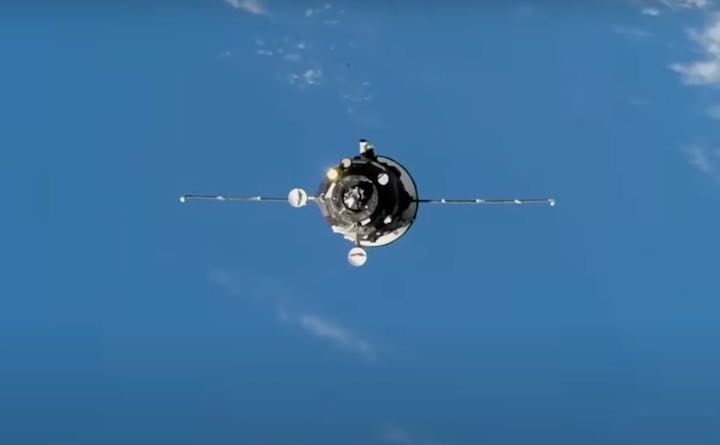30.10.2021

Two days after launching from the Baikonur Cosmodrome in Kazakhstan, a Russian Progress cargo freighter autonomously docked with the International Space Station Friday to deliver nearly three tons of fuel, food, and other supplies for the lab’s seven-person crew.
The Progress MS-18 cargo ship linked up with the aft port of the space station’s Zvezda service module at 9:31 p.m. EDT Friday (0131 GMT Saturday), wrapping up a picture-perfect radar-guided rendezvous more than 250 miles (400 kilometers) above Earth.
The docking occurred as the space station orbited over Argentina. Cosmonauts Anton Shkaplerov and Pyotr Dubrov monitored the Progress spacecraft’s final approach, ready to issue commands or take over manual control if necessary.
But the ship’s Kurs rendezvous radar guided the cargo freighter to a smooth docking three minutes earlier than scheduled.
“It doesn’t get much smoother than that — a flawless ride from the launch pad in Baikonur to docking at the International Space Station,” said Rob Navias, commentator for the docking coverage on NASA TV.
The Progress MS-18 spacecraft launched at 8 p.m. Wednesday (0000 GMT Thursday) from Baikonur atop a Soyuz-2.1a booster. The Soyuz rocket deployed the cargo craft in orbit less than nine minutes later, and the Progress supply ship unfurled its solar arrays and navigation antennas to begin the journey to the space station.
Burns using the 23.6-foot-long (7.2-meter) spacecraft’s small rocket thrusters maneuvered the Progress into the same orbit as the space station, setting up for final approach Friday night.
The Progress spacecraft took a two-day flight to the space station, and not the usual three- or six-hour trip, because the orbiting complex was not in the right position relative to the Baikonur launch base at liftoff time Wednesday to make the fast-track rendezvous possible.
Launching a crew or cargo mission on a quick rendezvous to the station requires the outpost to be nearly directly overhead the launch pad when a rocket takes off.
The Progress MS-18 spacecraft linked up with the rear docking port on Zvezda, near the location of a small air leak. Cosmonauts traced the leak, which remains minor, to the transfer compartment leading to Zvezda’s rear port.
The compartment has been sealed from the rest of the space station since the departure of a previous Progress spacecraft from the rear docking port in April. But cosmonauts will re-open the compartment to unload cargo delivered by the Progress MS-18 spacecraft.
The mission is the 79th Russian Progress supply craft to launch toward the International Space Station since 2000.
Roscosmos, Russia’s space agency, said the Progress MS-18 spacecraft carried around 5,377 pounds (2,439 kilograms) of supplies to the station.
Russian ground teams loaded 3,327 pounds (1,509 kilograms) of dry cargo into the Progress freighter’s pressurized compartment, according to Roscosmos. The space agency said the mission carries 1,036 pounds (470 kilograms) of propellant to refuel Zvezda module’s propulsion system, 926 pounds (420 kilograms) of fresh drinking water, and 88 pounds of compressed gas to replenish the space station’s breathing air.
The arrival of the Progress MS-18 supply ship follows the relocation of the Progress MS-17 cargo craft last week from one space station docking port to another. Progress MS-17 moved to a docking port on Russia’s Nauka lab module, the newest element of the space station, to help perform leak checks of the module’s propulsion system before it is used to control the lab’s orientation, or attitude.
Progress MS-17 will undock from the space station next month to clear the way for arrival of another new Russian module, named Prichal, set for launch from Baikonur on Nov. 24.
Meanwhile, NASA is gearing up to launch four astronauts to the space station Sunday from Kennedy Space Center in Florida, weather permitting. The crew will ride a SpaceX Dragon capsule to the station to begin a six-month expedition in orbit, replacing an outgoing team of astronauts scheduled to return to Earth in early November.
Quelle: SN
